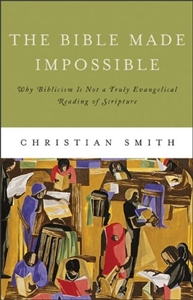Scot McKnight, a popular Evangelical author and one of the most Catholic-friendly Protestants, writes about a new book called The Bible Made Impossible: Why Biblicism Is Not a Truly Evangelical Reading of Scripture.
(Biblicism is a belief in the Bible, and the Bible alone, as the anchor of faith. It stems from the philosophy of “sola Scriptura”, the famous Reformation rallying cry.)
Scot’s post and the upcoming book hit right at the heart of two major flaws in Protestantism:
- In order to trust the Bible you need to trust the Bible’s origin. If you say the Catholic Church wasn’t given the authority to define doctrines, then neither did she have the authority to define the books of the Bible back in the fourth century. How can Protestants be sure that the books that make up their Bible–and only those books–are the inspired Word of God? They can’t accept them unless they take for granted the authority of Church.
- Any appeal to Scripture is an appeal to an interpretation of Scripture. Biblical interpretation is really not a question of “what does the Bible say?” but “what do I or my community think the Bible says?” But what happens when two people think the same Bible verse means two different things? Why should someone believe the interpretation of this teacher, or that writer, or that church instead of others? It really boils down to the question of authority–who has the authority to ultimately explain the meaning of the text? The Catholic Church holds that her interpretation is the true one since she alone was given the authority of Christ (Matthew 16:19), an authority which has been passed down through the centuries. She alone was promised the protection of the Holy Spirit.
What makes The Bible Made Impossible even more interesting is that its author, the notable sociologist Christian Smith, began writing it as an Evangelical.
Upon finishing the book, however, he converted to Catholicism.
(I don’t mean to sound triumphant about someone leaving Evangelicalism for the Catholic Church, though it does bring me joy. I just think the two points above are essentially unanswerable by Protestants and form two of the strongest cases for the Catholic Church.
If you want more information on topics like this, check out the writings of Devin Rose, Brent Stubbs, and Patrick Vandapool. I also recommend Devin’s new book, “If Protestantism Is True”)
I’d love to hear your comments!


